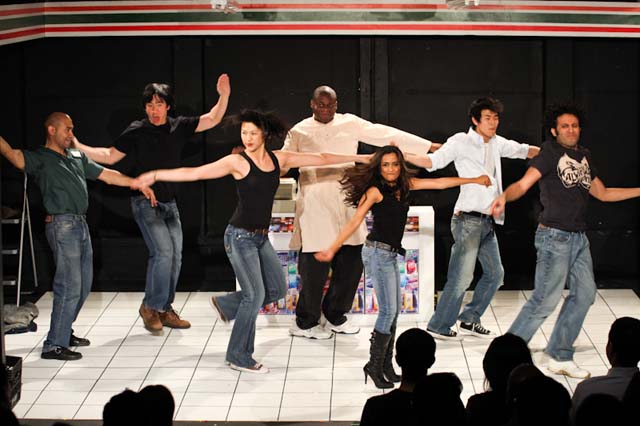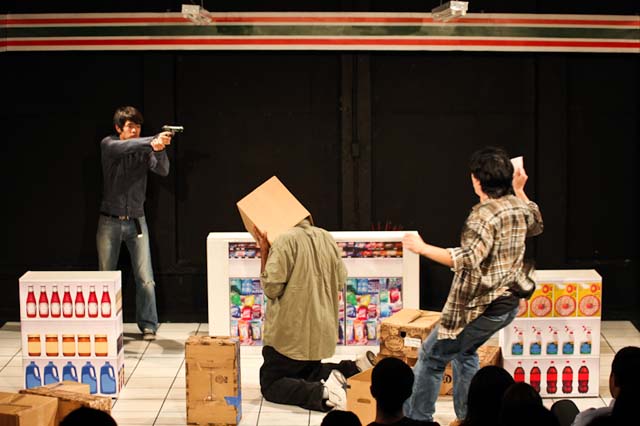
The 711 stores are a staple of Indian-American life with the American Dreams of many immigrants starting in the prosaic setting of six packs of beer, candy and toilet paper. For the past 7 years, Desipina & Company, a young, innovative theater company, turned this ubiquitous store setting into a venue of high drama, comedy and plain zaniness. Desipina, founded by sisters Rohi Mirza Pandya and Rehana Mirza, created Seven.11 Convenience Theater – 7 plays of 11 minutes each, each set in a convenience store.
For seven years, young actors, playwrights and musicians let down their hair and through humor, some pathos and a dose of brutal honesty, took on the larger issues of identity, color and immigration.
Now in its 7th year, Seven.11 Convenience Theater is dimming the lights. Says Rehana Mirza, “In part, our artistic aspirations have moved beyond what can be done in 11 minutes, but also, all of our artists, including ourselves, have been running the store with little to no funding. We want to be able to end on a high note with Seven.11, while also turning an eye towards a future where South Asian and Asian American theater is valued to the point where it has as many donors as other mainstream non-profit theaters.”
In this last hurrah, Andrew Guilarte, Kavi Ladnier, Cindy Cheung, Sam Ghosh and an ensemble cast put together a punchy, lively performance. The mix of seven plays included pop musical ‘Soonderella’ by Samrat Chakrabarti and Sanjiv Jhaveri, and ‘What’s In Store’ by Rehana Mirza.
Sad to see it go and I’ll probably never enter a convenience store without thinking of the many stories that lie untold within its walls. The Seven.11 Theater folks, however, all moving on to new things, closed up shop on a high note, appropriately enough with beer and camaraderie at the night spot Duvet in Manhattan. Goodbye, Apu!

REHANA MIRZA ON CLOSING UP THE STORE
Q: Why did you decide to shut the store? Was it that the funding was not available or you wanted to move on?
A: Rohi and I pride ourselves on putting quality work out there that challenges audiences as well as pushes forward the work of South Asian and Asian American artists. As we approached our seventh year of Seven.11, I think we had some financial concerns as well as concerns surrounding our desire to innovate, and not just rest on our flagship production. In part, our artistic aspirations have moved beyond what can be done in 11 minutes, but also, all of our artists, including ourselves, have been running the store with little to no funding.
We want to be able to end on a high note with Seven.11, while also turning an eye towards a future where South Asian / Asian American theater is valued to the point where it has as many donors as other mainstream non-profit theaters. We would love to share a theater space with other innovative Off-off Broadway companies like Youngblood, Vampire Cowboys, etc. so that we can focus more on the art that we want to create rather than the woes of producing on a shoestring budget in somebody else’s space. Of course, that takes focus, and captial campaigns, which we need to organize as well. So, we’re shifting priorities.
Q: What’s been the high point of the 7 years of 711?
A: There have been so many memories created through Seven.11, as well as long lasting collaborations. I think that there is a community amongst the artists and volunteers who have gone through the Seven.11 experience, and that type of support and camaraderie was specifically what we were looking for when we first began the series. It’s a hard business to have a go at it on your own, and now we have a network of over 50 playwright and 60 actors who have come through the Seven.11 doors. Not to mention, we’ve forged a strong relationship with our designers who do the show year after year, and our volunteers who have stuck with us through the years.
Q: Who are some of the important players in the 711 saga?
A: There have been so many people who have helped us – it’s become impossible to thank them enough. Samrat Chakrabarti and Sanjiv Jhaveri, who wrote the musicals have been hugely supportive the past seven years. Samrat also acted as musical director, as well as composer for the musicals, but also orchestrated the transition music during a few of the years, including this final one. Sanjiv also directed our fifth year, as well as served as dialogue coach throughout the years.
While many of the faces change each year, one actor celebrates five years of doing the show with us, Andrew Guilarte, and he really has been a bedrock in the ensemble casting. This year he does the most quick changes he’s ever done — being in five out of the seven short plays too. Also, some of our designers have been with us over the past five years – like Jeff McCrum for lighting, who also has taken our press photos and Jenny Fisher with costumes; they have both done outstanding jobs throughout the years. Of course, there’s also Gitesh Pandya, who has been working pro bono on marketing as well.
Q: Do you plan to bring it back in some form later?
A: We’re hoping to raise the funding to try to make a series of short films out of our seven favorite pieces.
Q: Did the skits and humor have a deeper intent re: race, immigration, gender?
A: The skits do have a deeper intent. As a playwright myself, I am drawn to stories that use humor to tackle big issues. So while it’s tough to get deep into issues in 11 minutes, I think that all the plays really give us glimpses into diverse experiences, as well as issues on race and gender. I’m proud of our final year’s curation and how the broad range of stories speak to so many different viewpoints in so many different ways.

2 Comments
Thanks, Hemant. I pursue and write these stories because I genuinely am intrigued by the varied lives people lead but it’s always a bonus to learn that readers also enjoy these different perspectives.
Lavina:
I am learning so much about our Indian American community, particularly, in arts and non-high-tech world
from reading your blogs that it has now become a part of my daily read. Please keep this up.